|
|
|
Sort Order |
|
|
|
Items / Page
|
|
|
|
|
|
|
| Srl | Item |
| 1 |
ID:
130544
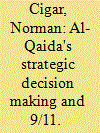

|
|
|
|
|
| Publication |
2014.
|
| Summary/Abstract |
As the united states draws down its military presence in Afghanistan, it is appropriate to revisit how the war was ignited and , in particular, Al-Qaida's role in that process. An understanding of Al-Qaida's thinking in preparing and executing this operations provides helpful insight into its decision making system and into its planning process in relation to both overall policy and, specifically, to its decision to launch the 9/11 operation in 2001.
|
|
|
|
|
|
|
|
|
|
|
|
|
|
|
|
| 2 |
ID:
120051
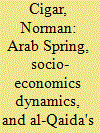

|
|
|
| 3 |
ID:
174243


|
|
|
| 4 |
ID:
153495
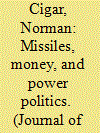

|
|
|
|
|
| Summary/Abstract |
This study examines the triangular political-military relationship revolving around missile sales involving Russia, Ukraine, and Saudi Arabia. Its principal thesis is that this development, if it comes to pass, could weaken further, and perhaps fatally, the Missile Technology Control Regime, which has always been a fragile instrument to control missile proliferation. A second thesis is that such a missile sale is a complex process, with political, economic, and psychological factors often as important as technical ones, and that all of these aspects must be taken into consideration in any analysis.
|
|
|
|
|
|
|
|
|
|
|
|
|
|
|
|
| 5 |
ID:
186640
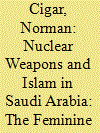

|
|
|
| 6 |
ID:
177922
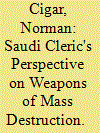

|
|
|
|
|
| Summary/Abstract |
This is a study of a legal treatise by the Saudi clericc A'id Al-Qarni, published in a military journal, one of the first attempts in the region to come to grips with the ethics of Weapons of Mass Destruction (WMD). Saudi Arabia offers an especially relevant real-world case study, given the continuing importance of Islam in its socio-political system and the indications that Riyadh has been considering acquiring nuclear weapons. Al-Qarni deals with the moral and legal –and essentially religiously-based, mingled with Realpolitik--considerations relevant to the acquisition and potential use of WMD, and especially of nuclear weapons, addressing issues such as deterrence, first-strike, targeting, and proportionality. This study engages an actual player, identifying and analyzing his ideas, rather than limiting the approach to only a theoretical perspective and positing how Muslim clerics could or should think, and concludes that the findings in Al-Qarni's treatise legitimize and contribute to the proliferation and use of WMD.
|
|
|
|
|
|
|
|
|
|
|
|
|
|
|
|
| 7 |
ID:
054233
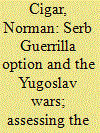

|
|
|
|
|
| Publication |
Jul-Sep 2004.
|
|
|
|
|
|
|
|
|
|
|
|
|
|
|
|
| 8 |
ID:
092900
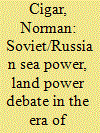

|
|
|
|
|
| Publication |
2009.
|
| Summary/Abstract |
The tumultuous change-or perestroika-after Mikhail Gorbachev came to power in 1985 opened the way for a wide-ranging debate on the most basic aspects of defense, and even of the country's very identity, including the age-old dilemma of whether the USSR/Russia is at heart a seapower or a landpower. The debate-which swirled around issues such as the country's geography, national interests, security threats, foreign policy, history, and the economy-highlighted the difficulty of balancing the country's orientation in these two basic realms. In its aftermath, the Navy underwent significant reductions in construction, training, and deployments. However, given the likely reassertion of Russian military activity in future years, these earlier arguments can provide a guidepost to a likely revived, albeit updated, debate by proponents of seapower or landpower.
|
|
|
|
|
|
|
|
|
|
|
|
|
|
|
|
|
|
|
|
|